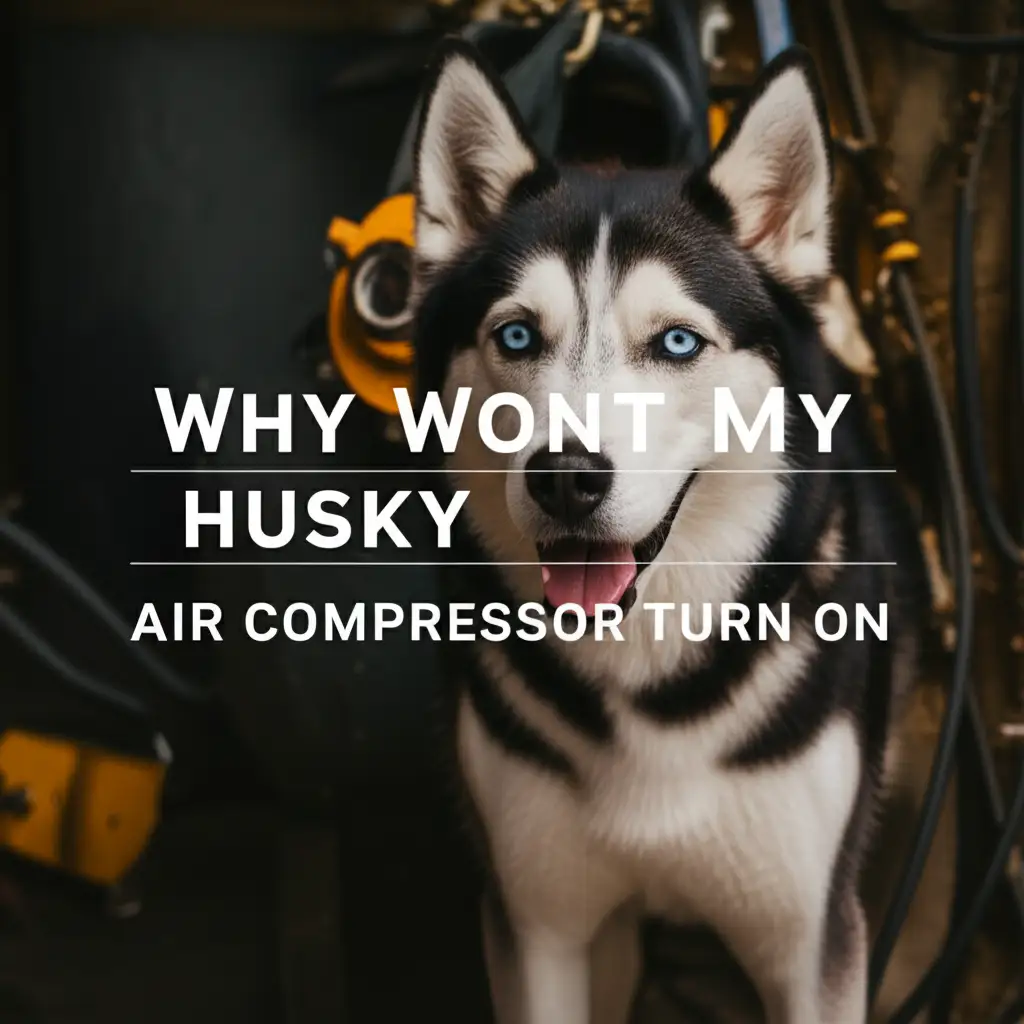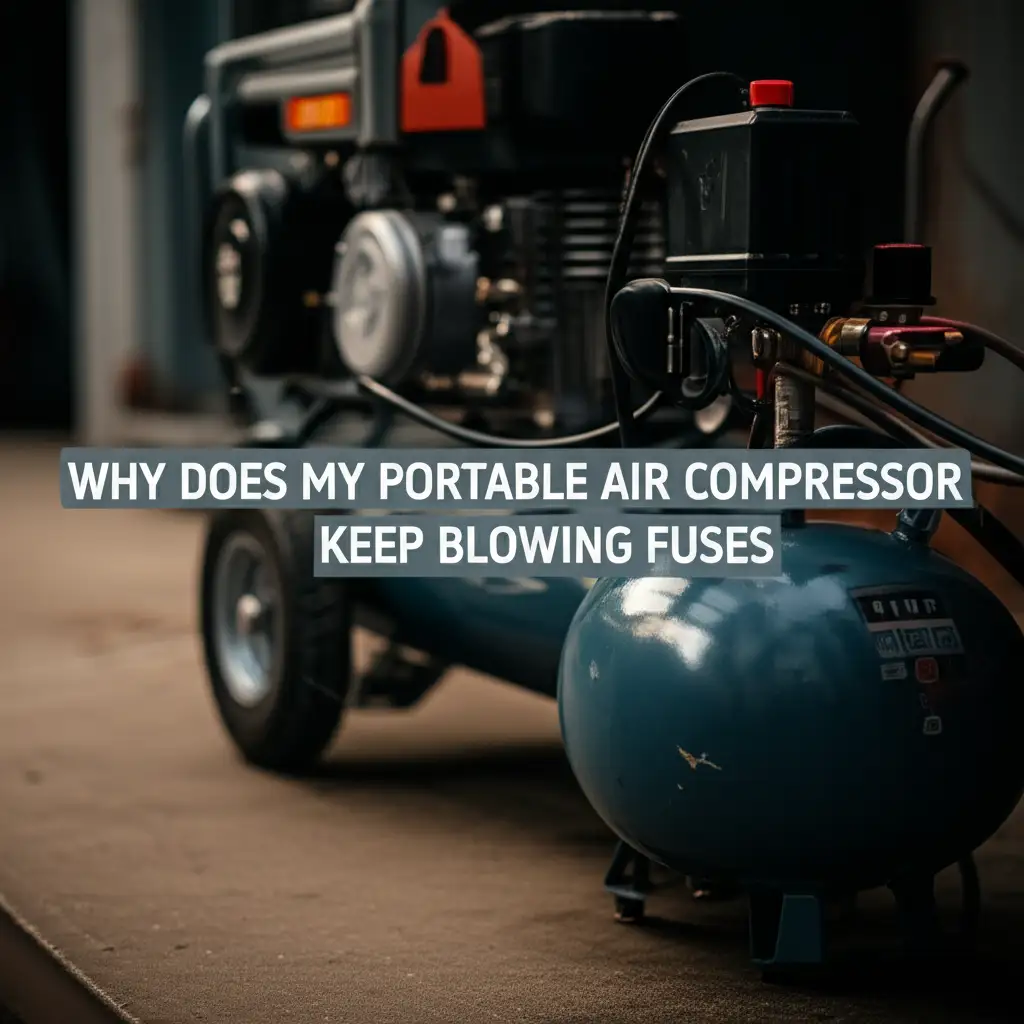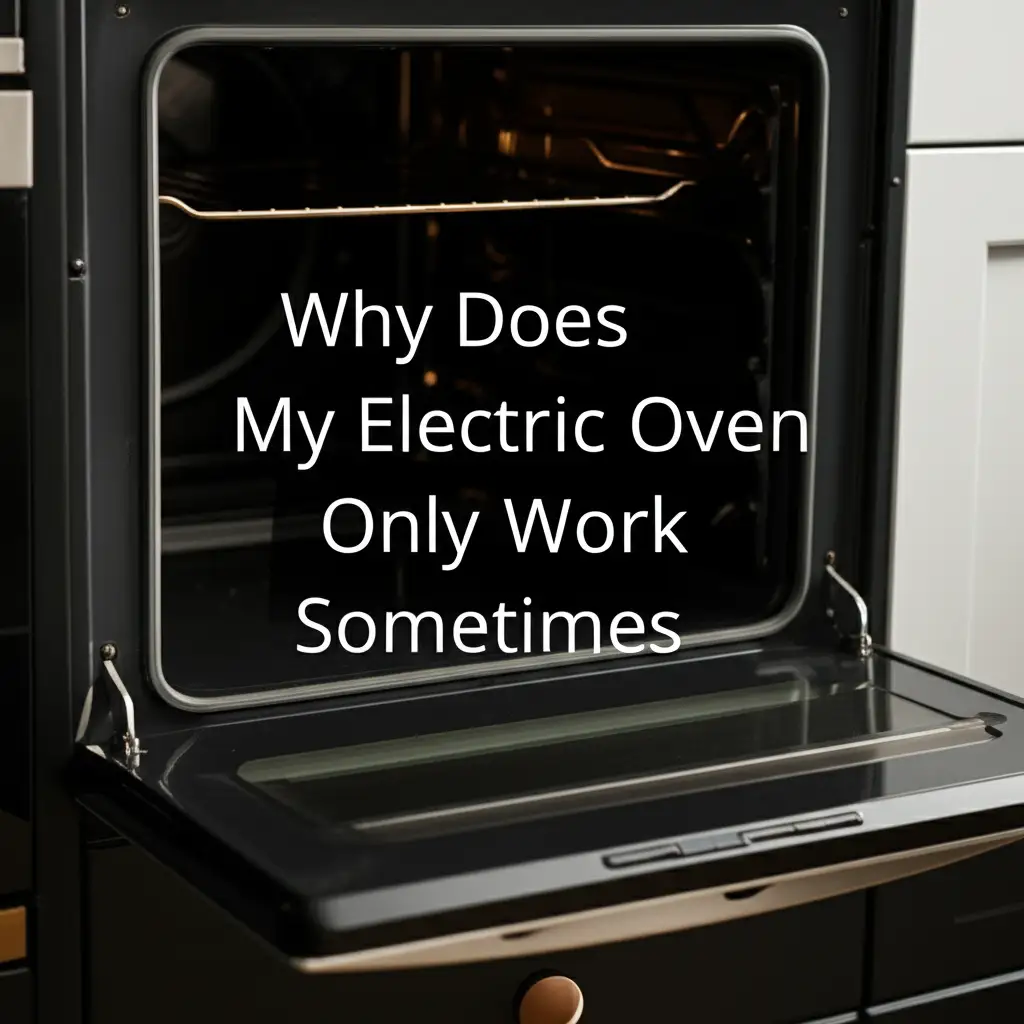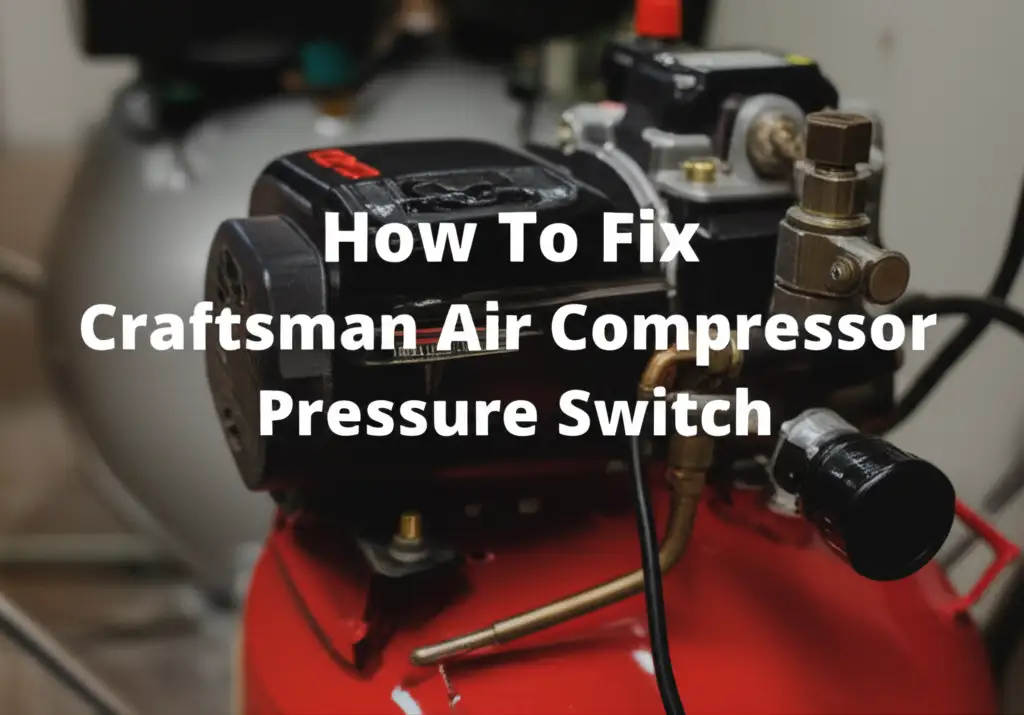· Todd Martin · Tools & Equipment · 13 min read
Why Does My Portable Air Compressor Keep Shutting Off
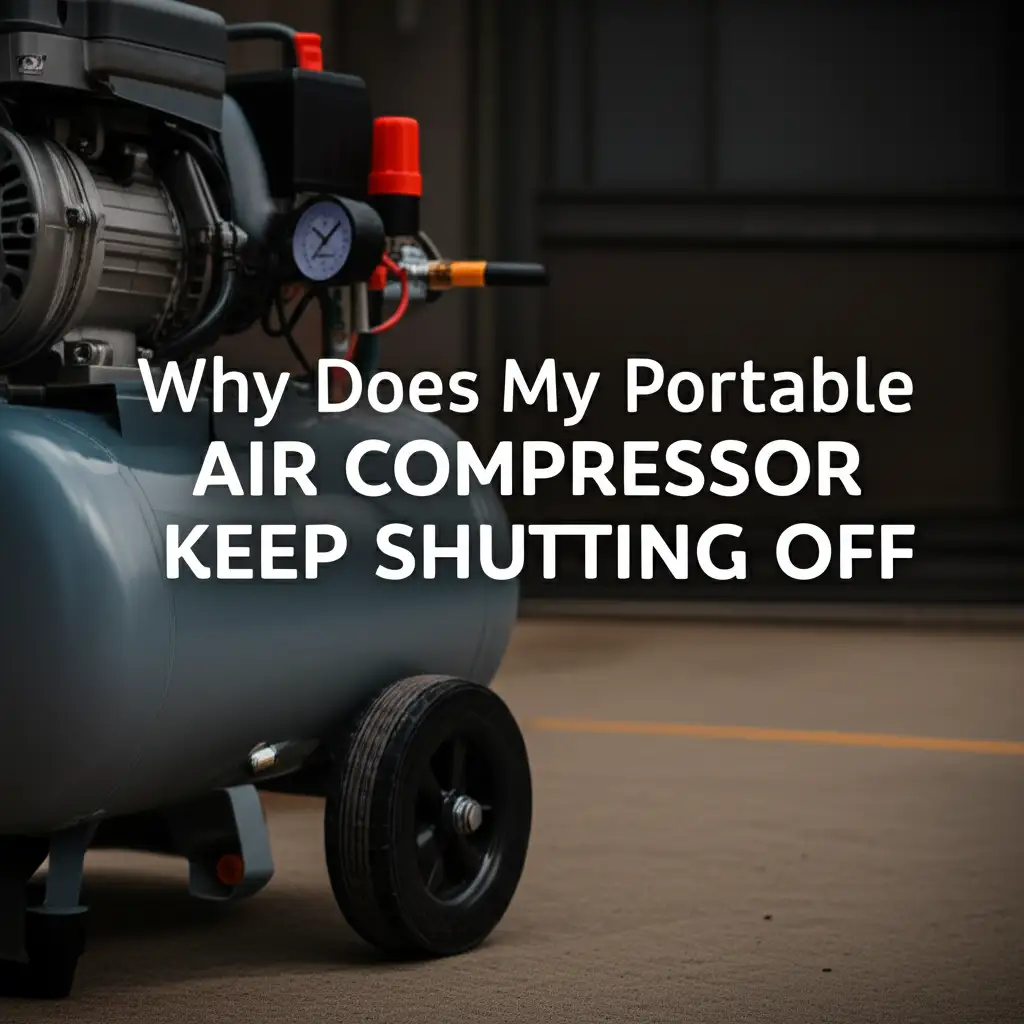
Portable Air Compressor Keeps Shutting Off? Here’s Why!
There are few things more frustrating than when your portable air compressor suddenly stops working. You might be inflating a tire, powering a nail gun, or simply topping off a low-pressure item, and then, silence. Why does your portable air compressor keep shutting off? This common problem affects many users, disrupting tasks and causing headaches. Understanding the root causes helps you fix the issue and get back to work. I know how important it is to have reliable tools, and a malfunctioning air compressor can stop your project dead in its tracks. In this article, we will explore the most frequent culprits behind unexpected shutdowns, from simple electrical glitches to more complex internal component failures. We’ll provide clear steps to diagnose and resolve these issues, ensuring your compressor operates dependably.
Takeaway
When your portable air compressor shuts off, consider these immediate checks:
- Check Power: Confirm adequate power supply, proper extension cord, and outlet functionality.
- Feel for Heat: Overheating is a primary cause; ensure good ventilation and proper oil levels.
- Listen for Clicks: A faulty pressure switch might be cutting power prematurely.
- Inspect Filters: Clogged filters restrict airflow, leading to strain and shutdowns.
- Review Manual: Consult your compressor’s manual for model-specific troubleshooting.
Your portable air compressor typically shuts off due to safety mechanisms activating from overheating, insufficient power supply, or a malfunctioning pressure switch. Other causes include low oil levels, clogged filters, or internal component failures like a bad capacitor or motor issue.
Overheating: The Compressor’s Safety Stop
One of the most common reasons a portable air compressor keeps shutting off is overheating. Air compressors generate significant heat during operation. Manufacturers build in thermal overload protectors to prevent damage. This safety feature automatically cuts power when the motor or pump temperature rises too high. It protects the internal components from permanent damage.
Operating the compressor continuously for long periods often causes this problem. Every compressor has a duty cycle. This cycle specifies how long the unit can run before needing a cool-down period. If you exceed this duty cycle, heat builds up rapidly. Always allow your compressor to rest if it feels hot to the touch. This simple step prevents frequent shutdowns and extends the unit’s lifespan.
Poor ventilation also contributes to overheating. Your compressor needs proper airflow to dissipate heat. Do not operate it in enclosed spaces like small closets or tight corners. Ensure no debris or dust blocks the cooling fins or air vents. Keeping the unit in an open area helps air circulate freely around the motor and pump. This keeps temperatures within safe limits.
Low Oil and Lubrication Issues: Friction’s Fury
Low oil levels severely impact your air compressor’s performance and can cause it to shut off. Oil is critical for lubricating moving parts within the pump. It also helps dissipate heat generated by friction. When oil levels drop too low, friction increases dramatically. This causes components to overheat quickly.
An oil-lubricated compressor relies on the correct amount and type of oil. Without proper lubrication, metal parts grind against each other. This creates excessive heat and accelerates wear. The thermal overload protector senses this heat. It then shuts down the unit to prevent catastrophic failure. You should regularly check the oil level using the dipstick or sight glass. Make sure it is within the recommended range.
Using the wrong type of oil can also cause issues. Compressor oil has specific properties designed for high-pressure and high-temperature environments. Using motor oil or other substitutes might lead to poor lubrication. This can cause overheating and premature shutdowns. Always refer to your compressor’s manual for the exact oil specifications. Knowing what kind of oil does my Craftsman air compressor use or what kind of oil does an Ingersoll Rand air compressor take is crucial for proper maintenance. Changing the oil according to the manufacturer’s schedule is equally important. Dirty or degraded oil loses its lubricating properties over time. This also contributes to increased friction and heat. Regularly checking and changing your oil keeps your compressor running smoothly and prevents shutdowns. How to check oil level on Ingersoll Rand air compressor can provide helpful guidance.
Power Supply Problems: When the Juice Isn’t Flowing
Inadequate power supply is a frequent but often overlooked cause for a portable air compressor shutting off. Your compressor needs a consistent and sufficient amount of electricity to run efficiently. If the voltage drops below what the motor requires, it struggles to operate. This struggle causes it to draw more current, leading to overheating and activation of the thermal overload protector. This problem often occurs when using long or thin extension cords.
Extension cords must have the correct gauge (thickness) for the power draw and length. A cord that is too long or too thin creates voltage drop. This means the compressor does not receive full power. Always use heavy-duty extension cords with the proper amperage rating. Check the cord for damage like cuts or frayed wires. These can also cause intermittent power loss.
The power outlet itself can be a problem. An overloaded circuit or a faulty outlet may not provide steady power. Try plugging your compressor into a different outlet on a separate circuit. This helps rule out an issue with the specific power source. If the compressor still trips the breaker, the problem likely lies with the compressor unit. Remember, consistent power is fundamental for any motor-driven device. Ensuring this foundational element is sound can prevent many unexpected shutdowns.
Pressure Switch Malfunctions: The Brain’s Miscommunication
The pressure switch acts as the “brain” of your air compressor. It monitors the tank pressure and tells the motor when to turn on and off. When tank pressure drops below a set minimum, the switch activates the motor. When it reaches a set maximum, the switch cuts power. If this switch malfunctions, it can cause your compressor to shut off prematurely or fail to start.
A common issue is a faulty diaphragm or internal contacts within the switch. These parts wear out over time. Worn contacts might not make a clean connection, leading to intermittent power cuts. A damaged diaphragm can give incorrect pressure readings. This causes the switch to mistakenly believe the tank is full or over-pressurized. In either case, the compressor stops unexpectedly.
Sometimes, debris or moisture can get inside the pressure switch. This interferes with its operation. A sticky switch might remain open, preventing the motor from starting. Or it might close too soon, shutting off the compressor before reaching full pressure. If you suspect a pressure switch issue, listening for a distinct click when the compressor turns on and off can offer clues. No click, or an irregular click, might point to a problem. Consulting a professional for replacement might be necessary, as these components are crucial for safe operation. For related issues, understanding why an Ingersoll Rand air compressor might keep shutting off can offer broader insights into compressor shutdowns.
Clogged Filters and Restricted Airflow: The Compressor’s Breath
Air compressors rely on a constant flow of clean air for proper operation. Clogged filters and restricted airflow can significantly reduce efficiency and cause your portable air compressor to shut off. The air intake filter is the first line of defense. It prevents dust, dirt, and debris from entering the pump. If this filter becomes clogged, the compressor struggles to draw in enough air.
When the intake is restricted, the motor has to work harder to compress air. This increased strain leads to overheating. The motor draws more current, triggering the thermal overload protector. You might notice a drop in performance or a longer time to build pressure before the shutdown occurs. Regularly inspect and clean or replace your air intake filter. This simple maintenance step greatly improves compressor performance and longevity.
Beyond the intake filter, internal airflow can also become restricted. This might include issues within the check valve or the air lines themselves. A partially blocked check valve can prevent compressed air from moving freely into the tank. This traps pressure at the pump, causing it to overheat. Similarly, any kinks or damage in the air hose connected to your tools can restrict flow. This puts extra strain on the compressor. Ensuring clear pathways for air both into and out of the pump is vital for preventing unexpected shutdowns. Sometimes, a dirty air tank can also contribute to system inefficiencies. Learning how to clean an air compressor tank is beneficial for overall system health.
Motor and Electrical Component Failures: Deeper Issues
Beyond external factors, internal motor and electrical component failures can cause your portable air compressor to shut off. These issues often require more advanced troubleshooting and repair. One common culprit is a faulty start capacitor. The start capacitor provides a burst of electricity to help the motor overcome inertia and begin rotating. If it fails, the motor struggles to start or cannot start at all. This can lead to it humming and then shutting off as it draws too much current.
Motor winding issues are another serious problem. Over time, insulation on the motor windings can degrade due to heat or age. This leads to short circuits within the motor. A short circuit causes excessive current draw and immediate shutdown. You might smell burning plastic or hear unusual grinding noises if motor windings are failing. This type of problem often necessitates professional repair or motor replacement.
Loose or corroded wiring connections also interrupt power to the motor. Vibrations during operation can loosen terminals. Corrosion can build up on contacts. Both scenarios lead to intermittent power loss, causing the compressor to stop unexpectedly. Inspect all visible wiring connections. Ensure they are tight and free of corrosion. Addressing these deeper electrical issues often restores your compressor’s reliable operation.
Check Valve and Pressure Relief Valve Problems: Safety System Glitches
The check valve and pressure relief valve are critical safety components on your air compressor. Problems with either can lead to unexpected shutdowns or operational issues. The check valve allows compressed air to enter the tank but prevents it from flowing back into the pump once the motor stops. If the check valve fails, air can bleed back into the pump head.
When air flows back into the pump, it causes the motor to start against a pressurized head. This creates immense strain on the motor. It also causes it to overheat rapidly and trip the thermal overload protector. You might hear air hissing from the intake filter when the compressor shuts off if the check valve is faulty. This indicates air is escaping from the tank back through the pump. Replacing a faulty check valve is usually a straightforward repair.
The pressure relief valve (or safety valve) is a critical safety device. It releases excess pressure from the tank if the pressure switch fails. This prevents the tank from over-pressurizing and potentially exploding. While less common, a faulty pressure relief valve could open prematurely. This would release tank pressure and cause the compressor to run continuously without building adequate pressure. Eventually, the motor would overheat and shut down due to prolonged operation. A sticky or corroded relief valve might also cause issues, though its primary function is protection from overpressure. If your compressor repeatedly struggles to build or hold pressure, checking these valves is a wise step.
Preventing Future Shutdowns: Maintenance Tips
Regular maintenance significantly reduces the likelihood of your portable air compressor shutting off unexpectedly. Neglecting basic upkeep often leads to the issues discussed earlier. Establishing a routine maintenance schedule keeps your compressor running efficiently and extends its lifespan. This involves several simple, yet crucial, steps that anyone can perform.
First, always keep the air intake filter clean. This filter is the compressor’s “lungs,” protecting the internal components from harmful particles. Check it before each use or after every few hours of operation, especially in dusty environments. Clean it with compressed air or replace it if it’s too dirty or damaged. A clean filter ensures optimal airflow and reduces strain on the motor.
Second, for oil-lubricated models, regularly check and maintain the oil level. Low oil leads to increased friction and overheating, causing shutdowns. Consult your manual for the correct oil type and recommended change intervals. Using the right oil and keeping it at the proper level ensures smooth lubrication and heat dissipation. It also prevents premature wear of internal parts.
Third, ensure proper ventilation during operation. Never run your compressor in an enclosed space. Make sure the cooling fins are clear of dust and debris. Adequate airflow prevents heat buildup and allows the thermal overload protector to reset naturally. Finally, drain the moisture from the air tank after each use. Condensation inside the tank can lead to rust. Rust flakes can enter the air lines and cause blockages. This also helps prevent tank corrosion, ensuring the compressor’s long-term health and preventing performance issues that could lead to shutdowns.
FAQ Section
Why does my portable air compressor only run for a few minutes then shut off?
Your portable air compressor often runs for only a few minutes before shutting off due to overheating. This commonly occurs if you exceed the unit’s duty cycle. It can also happen if the air intake filter is clogged, or if the oil level is too low. Poor ventilation around the compressor can also cause rapid heat buildup.
How do I reset the thermal overload on my air compressor?
Most portable air compressors with thermal overload protection reset automatically after cooling down. First, unplug the unit and let it sit for 15-30 minutes. Ensure good airflow around it. Some models might have a manual reset button, usually a small red or black button near the motor. Press it firmly after the compressor cools.
Can a bad extension cord cause my air compressor to shut off?
Yes, a bad extension cord can definitely cause your air compressor to shut off. If the cord is too long, too thin (low gauge), or damaged, it can lead to a significant voltage drop. This deprives the compressor motor of adequate power. The motor then struggles, draws excessive current, and triggers the thermal overload protection.
What are the signs of a failing pressure switch on an air compressor?
Signs of a failing pressure switch include the compressor not starting at all, starting and immediately shutting off, or running continuously without reaching full pressure. You might hear an irregular click or no click from the switch. Air leaks near the switch or inconsistent pressure readings also indicate a problem.
How often should I clean the air filter on my portable compressor?
You should check your portable air compressor’s air filter before each use or every few hours of operation, especially in dusty environments. Clean or replace it as needed. A dirty filter restricts airflow, forcing the motor to work harder and potentially leading to overheating and shutdowns.
Is it normal for my portable air compressor to get hot?
Yes, it is normal for your portable air compressor to get warm during operation. Compressing air generates heat. However, it should not get excessively hot to the point of scalding. If it feels extremely hot to the touch or repeatedly shuts down, it is likely overheating, indicating an underlying issue.
Conclusion
Understanding why your portable air compressor keeps shutting off empowers you to diagnose and fix the problem. We explored various common culprits, from basic issues like overheating and inadequate power supply to more complex component failures such as a faulty pressure switch or motor problems. Regularly checking oil levels, ensuring proper ventilation, and maintaining clean filters are vital steps to prevent unexpected shutdowns. I hope this guide helps you keep your compressor running smoothly. By addressing these potential issues proactively, you can ensure your portable air compressor remains a reliable tool for all your projects. Don’t let a sudden shutdown derail your work; take control of your compressor’s performance today!
- Portable air compressor
- Compressor troubleshooting
- Air compressor repair
- Compressor maintenance
- Overheating compressor
- Pressure switch issues
- Electrical problems


